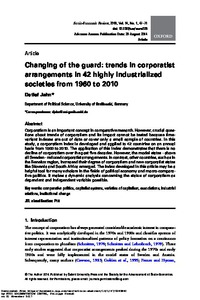Institutional legacy of state corporatism in de-industrial labour markets: a comparative study of Japan, South Korea and Taiwan

2016
14
1
January
73-95
industrialization ; labour market ; structural change ; corporatism
Japan ; South Korea ; Taiwan
Industrial economics
https://doi.org/10.1093/ser/mwv029
English
Bibliogr.
"De-industrialization has created new economic environments for Japan, South Korea and Taiwan. While structural changes in the labour market took place rather rapidly, accompanying institutional changes have been more gradual. While maintaining some core institutional arrangements, each country has adjusted to new labour market challenges and thereby created various labour market risks. In the period of de-industrialization, both South Korea and Japan experienced a sharp increase in the proportion of atypical workers, unlike the case of Taiwan. This study investigates how the institutional legacy of state corporatism matters in explaining how these three economies have differed in two respects: (a) a rapid increase in the proportion of atypical workers, and (b) the gendered characteristic of atypical employment—that is to say, a disproportionate concentration of women in atypical employment."
Digital
The ETUI is co-funded by the European Union. Views and opinions expressed are however those of the author(s) only and do not necessarily reflect those of the European Union or the ETUI.